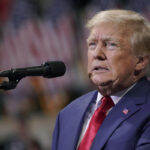
The world hasn’t forgotten the steely visage and rank bellicosity Vladimir Putin summoned up in late February when, ahead of his illegal invasion of Ukraine, he railed against what he claimed was the existential threat posed to Mother Russia by the West. It was a speech aimed at rallying Russians around the false cause of liberating Ukraine from “neo-Nazis” and warning the West about the consequences of interfering.
Everyone now knows just how badly Putin’s blustery gambit failed.
He underestimated Ukraine’s will to defend itself, and its ability to turn that determination into victory after victory on the battlefield.
Ukrainian forces turned back Putin’s all-out bid to take the capital, Kyiv, at the beginning of the war, and more recently routed Russian troops and tanks from the Kharkiv region in the country’s northeast.
On Wednesday, the world was again subjected to Putin’s stone-faced delivery of lies and threats, as the Kremlin leader announced a call-up of 300,000 Russian reservists. This time, however, he dangled the possibility of reaching into his massive stockpile of nuclear weapons to achieve his aims. “We will use all the means we have,” Putin sternly warned. “And I’m not bluffing.”
Putin’s insistence to be taken at his word could indeed be merely a bluff, as some analysts posit. Or, feeling cornered and on the losing end of a conflict for which he is wholly culpable, it could be that he now considers usage of nuclear weapons as a viable option.
The West has learned by now to never underestimate Putin. After all, he has kept a country with an economy smaller than Canada’s at the forefront of world politics by deftly wielding what tools he has — energy as a political cudgel, assassinations, cyber-offensives, and proxy wars, to name a few.
So, what should be the West’s takeaway from Putin’s latest fist-shaking?
Putin’s speech revealed a leader who should be seen as dangerous, but by the same measure desperate. He tried to sound defiant and iron-willed, particularly to the audience that matters most to him — Russia’s 145 million citizens. But Russians who had largely expressed indifference about the conflict because it hadn’t touched their lives now are viscerally connected to it, since able-bodied men from all corners of Russian society — not just reservists — are vulnerable to being dispatched to the Donbas.
The reaction from Russians can hardly be the one Putin desired. Instead of heeding their leader’s call to mobilize, Russian men are fleeing every which way they can, heading to airports with backpacks and suitcases, or piling into cars and driving toward the border. Flight costs out of Moscow ballooned as Russian men especially targeted any country that would let them in without a visa.
No one can blame Russians for seeing Putin’s call-up not as a cause to rally around, but as the act of a leader with his back against the wall.
That’s also the way the West should see it.
Rather than recoiling at Putin’s bombast and treating him with kid gloves, President Joe Biden and every other Western leader should double down and ramp up the military support that has helped Ukrainian President Volodymyr Zelenskyy and his forces turn the tide against Putin’s illegal, ruinous invasion.
Putin’s desperation should also reinforce NATO nations’ resolve to collectively withstand the Kremlin’s likely shut-off of Russian natural gas and oil to Europe ahead of winter. It will mean sacrifice and economic hardship, perhaps even recession. But it’s not Putin who has the upper hand, it’s the West and Ukraine with the leverage.
At some point, diplomacy will take the stage and negotiations for peace will begin. But that time isn’t now, not while Putin escalates not only with a massive buildup of troops, but with sham referendums in Ukraine’s eastern Donbas region that will lead to the Kremlin’s illegal annexation of yet more Ukrainian territory.
For Putin, however, Ukraine isn’t simply a land grab. It’s a template that, if successful, could be applied elsewhere, even to Poland, Romania, the Baltics and the rest of NATO’s eastern flank. And as U.S. Secretary of State Antony Blinken told the U.N. Security Council Thursday, safeguarding Ukraine from Putin’s belligerence is also about “protecting an international order where no nation can redraw the borders of another by force. If we fail to defend this principle, when the Kremlin is so flagrantly violating it, we send a message to aggressors everywhere that they can ignore it too.”
Putin is gambling that his narrative, though patently false, will stir up enough patriotic fervor among Russians to turn the war’s momentum against Ukraine and the West — though protests across the country Wednesday suggest many Russians see straight through their leader’s artifice.
Putin’s also betting that his veiled threats about the usage of nuclear weapons will intimidate the Biden administration and Western governments into acquiescence. He’s counting on the U.S. and Europe to see him as a force to be feared.
Instead, however, the West must treat him as a desperate, flawed leader who, unless he changes course soon, will find himself played out.
Join the discussion on Twitter @chitribopinions and on Facebook.
Submit a letter, of no more than 400 words, to the editor here or email letters@chicagotribune.com.




